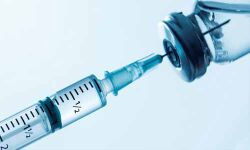- Home
- Medical news & Guidelines
- Anesthesiology
- Cardiology and CTVS
- Critical Care
- Dentistry
- Dermatology
- Diabetes and Endocrinology
- ENT
- Gastroenterology
- Medicine
- Nephrology
- Neurology
- Obstretics-Gynaecology
- Oncology
- Ophthalmology
- Orthopaedics
- Pediatrics-Neonatology
- Psychiatry
- Pulmonology
- Radiology
- Surgery
- Urology
- Laboratory Medicine
- Diet
- Nursing
- Paramedical
- Physiotherapy
- Health news
- Fact Check
- Bone Health Fact Check
- Brain Health Fact Check
- Cancer Related Fact Check
- Child Care Fact Check
- Dental and oral health fact check
- Diabetes and metabolic health fact check
- Diet and Nutrition Fact Check
- Eye and ENT Care Fact Check
- Fitness fact check
- Gut health fact check
- Heart health fact check
- Kidney health fact check
- Medical education fact check
- Men's health fact check
- Respiratory fact check
- Skin and hair care fact check
- Vaccine and Immunization fact check
- Women's health fact check
- AYUSH
- State News
- Andaman and Nicobar Islands
- Andhra Pradesh
- Arunachal Pradesh
- Assam
- Bihar
- Chandigarh
- Chattisgarh
- Dadra and Nagar Haveli
- Daman and Diu
- Delhi
- Goa
- Gujarat
- Haryana
- Himachal Pradesh
- Jammu & Kashmir
- Jharkhand
- Karnataka
- Kerala
- Ladakh
- Lakshadweep
- Madhya Pradesh
- Maharashtra
- Manipur
- Meghalaya
- Mizoram
- Nagaland
- Odisha
- Puducherry
- Punjab
- Rajasthan
- Sikkim
- Tamil Nadu
- Telangana
- Tripura
- Uttar Pradesh
- Uttrakhand
- West Bengal
- Medical Education
- Industry
PCSK9 inhibitors not linked to serious adverse effects except injection-site reactions: BMJ

In a new study conducted by Jing Li and team it was found that PCSK9 inhibitors slightly increase the risk of severe injection-site reaction but not cataracts, gastrointestinal haemorrhage, neurocognitive events, new-onset diabetes or severe myalgia or muscular pain.
The findings of this study were published in a British Medical Journal.
The purpose of this study was to investigate the risks of proprotein convertase subtilisin/ kexin 9 inhibitors in persons requiring lipid-lowering treatment. This comprehensive analysis includes randomized controlled studies that compared PCSK9 inhibitors to placebo, usual care, or active lipid-lowering comparators in persons who needed lipid-lowering medication and had at least a 24-week follow-up. For this study researchers used random-effect pairwise meta-analyses to summarize the relative impacts of PCSK9 inhibitors on possible hazards using GRADE (Grading of Recommendation Assessment, Development, and Evaluation) for each outcome.
The key findings of this study were as follow:
1. This analysis includes 32 trials with a total of 65 861 patients (with a median follow-up time of 40 weeks ranging from 24 to 146 weeks).
2. The meta-analysis revealed an incidence of injection-site reaction, which resulted in cessation.
3. With high confidence, PCSK9 inhibitors do not raise the incidence of new-onset diabetes, neurocognitive problems, cataracts, or gastrointestinal bleeding.
4. With intermediate evidential certainty, PCSK9 inhibitors do not enhance the chances of myalgia or muscle pain leading to cessation or any side events leading to discontinuation.
5. Given the scarcity of data, PCSK9 medications may not worsen influenza-like symptoms, necessitating withdrawal (risk ratio 1.5; 95% CI 0.06 to 36.58).
6. Researchers found no reliable subgroup analysis results, such as shorter versus longer trial follow-up time.
In conclusion, the findings of this study suggest no as such relationship between proprotein convertase subtilisin/ kexin 9 and occurrence of gastrointestinal hemorrhage, cataracts, neurocognitive problems, new-onset diabetes, or severe myalgia or muscle discomfort.
Reference:
Li, J., Du, H., Wang, Y., Aertgeerts, B., Guyatt, G., Hao, Q., Shen, Y., Li, L., Su, N., Delvaux, N., Bekkering, G., Khan, S. U., Riaz, I. B., Vandvik, P. O., Su, B., Tian, H., & Li, S. (2022). Safety of proprotein convertase subtilisin/kexin 9 inhibitors: a systematic review and meta-analysis. In Heart (p. heartjnl-2021-320556). BMJ. https://doi.org/10.1136/heartjnl-2021-320556
Meghna A Singhania is the founder and Editor-in-Chief at Medical Dialogues. An Economics graduate from Delhi University and a post graduate from London School of Economics and Political Science, her key research interest lies in health economics, and policy making in health and medical sector in the country. She is a member of the Association of Healthcare Journalists. She can be contacted at meghna@medicaldialogues.in. Contact no. 011-43720751
Dr Kamal Kant Kohli-MBBS, DTCD- a chest specialist with more than 30 years of practice and a flair for writing clinical articles, Dr Kamal Kant Kohli joined Medical Dialogues as a Chief Editor of Medical News. Besides writing articles, as an editor, he proofreads and verifies all the medical content published on Medical Dialogues including those coming from journals, studies,medical conferences,guidelines etc. Email: drkohli@medicaldialogues.in. Contact no. 011-43720751


